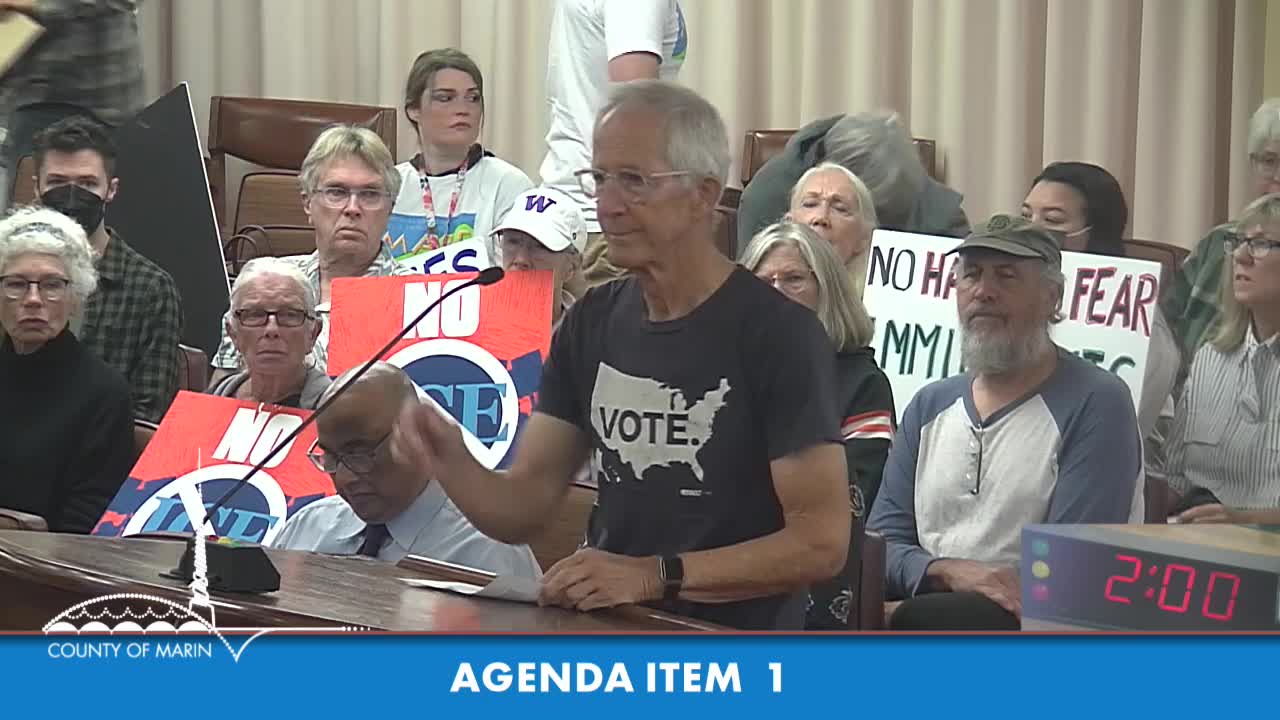Marin residents press supervisors to stop sheriff—s cooperation with ICE; county executive outlines existing supports and oversight timeline
Get AI-powered insights, summaries, and transcripts
Subscribe
Summary
Dozens of residents urged the Marin County Board of Supervisors to demand Sheriff Jamie Scardina stop sharing booking information and participating in the State Criminal Alien Assistance Program (SCAP). County Executive Derek Johnson described county services and said oversight work is underway but that structural steps remain.
Lede: Dozens of Marin County residents urged the Board of Supervisors Wednesday to use its authority to stop the county sheriff—s voluntary cooperation with U.S. Immigration and Customs Enforcement, calling for an end to public posting of jail booking logs and withdrawal from the State Criminal Alien Assistance Program, or SCAP.
Nut graf: Speakers during a lengthy public-comment period said the sheriff—s office—s sharing of release dates and other booking details enables ICE arrests and that SCAP creates a per-detainee reimbursement that they called a financial incentive to cooperate. County Executive Derek Johnson responded with an overview of county-funded immigrant support services and described the newly created Civilian Oversight Commission—s work plan but told speakers the commission is still building its foundation.
Body: Starting in the morning public-comment block, residents delivered similar requests: stop publishing booking logs online, halt SCAP reimbursement requests, and refuse future SCAP applications. Multiple speakers identified a petition with nearly 3,000 signatures asking the board to act.
"For years, the sheriff's office has chosen, they're not under obligation, to share personal information of people in their custody with ICE," said a public commenter, summarizing the principal complaint. Commenters said online booking logs, which sometimes list release dates, enable ICE officers to locate and detain people after jail release.
Speakers cited figures they attributed to reporting and local aggregations: more than $1.2 million received by the sheriff's office and more than 1,000 individuals booked over the past three years under SCAP. Several speakers said SCAP participation amounts to monetizing incarceration.
County Executive Derek Johnson responded after public comment. He reminded the board that Senate Bill 54 prohibits use of local law-enforcement resources to enforce immigration law but described SCAP as a federal reimbursement program that offsets unfunded local costs for housing people arrested and incarcerated for criminal offenses for four or more days, and he said SCAP "does not involve the use of county resources for immigration." Johnson described county-funded immigrant services and measures the county is already taking, including a $500,000 allocation last year for immigrant support services, partnerships to provide pro bono legal services, a rapid-response fund, and an immigrant emergency assistance fund administered with community partners.
Johnson also said the county created a Civilian Oversight Commission and that the commission is establishing bylaws, a code of conduct, and the process to hire an inspector general and staff who would be able to review matters such as SCAP in the future. He said the county executive's office provided a memo to the commission and that "we recognize that SCAP may appropriately come before the commission in the future."
Discussion vs. decision: Speakers repeatedly urged immediate board action. The board did not take a vote or instruct the sheriff during the meeting; Johnson—s remarks described programs and the oversight commission—s staged work rather than a board directive to halt SCAP or booking-log publication.
Ending: Public commenters and community groups said they will continue to press the board and sheriff's office, supplying petitions and volunteer rapid-response networks to support people encountered by ICE. The county executive said staff will continue to brief the board and the oversight commission on the topic as the commission builds its capacity.
